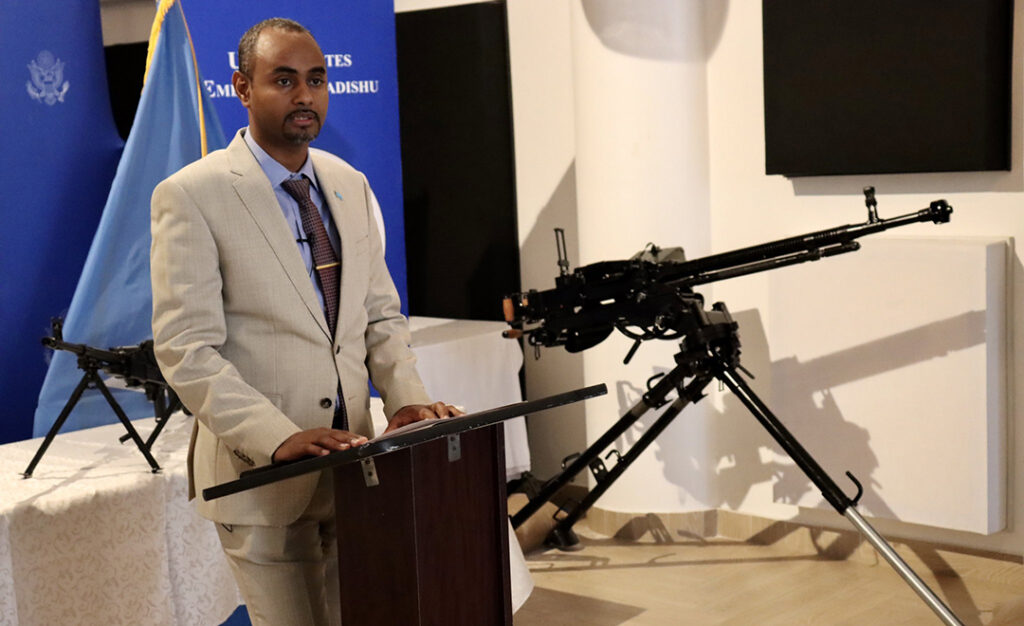ADF STAFF
The United States has given $9 million in weapons, vehicles, medical supplies and other equipment to the Somali National Army to help it battle the extremist group al-Shabaab.
The equipment, formally donated in a January 8 ceremony, includes support and construction vehicles, explosive ordnance disposal kits, medical supplies, and maintenance equipment for vehicles and weapons. Most of the supplies were shipped to Hishabelle and Galmudug states to support Somali National Army troops.
“Allow me to convey the appreciation of the Federal Government of Somalia to the Government of the United States of America for the continued support to Somalia’s peacebuilding process and the support for the fight against terrorism,” said Minister of Defense Abdulkadir Mohamed Nur Jama. “This support comes at a critical time for our forces as we boost their capabilities to combat al-Shabaab.”
Upon being elected president in May 2022, Hassan Sheikh Mohamud’s government declared “total war” on the terrorist organization, which has plagued the nation for decades.
Al-Shabaab has proved difficult to defeat, embedding itself in Somali society with a goal of creating an extremist Islamic state. The Associated Press (AP) reports that the extremist group has become adept at exploiting clan divisions and extorting millions of dollars a year from businesses and farmers in its “quest to impose an Islamic caliphate.”
The insurgency remains the country’s biggest security challenge. It controls large parts of the country’s south and continues to mount lethal attacks against civilians and international forces.
In the areas it controls, al-Shabaab enforces a particularly repressive interpretation of Shariah, banning such things as movies, music, smoking, western-style clothing and the shaving of beards.
“Stonings and amputations have been meted out to suspected adulterers and thieves,” reports the Council on Foreign Relations. “At the same time, the group bans cooperation with humanitarian agencies, creating a harrowing challenge in the face of unprecedented droughts.”
The droughts have pushed the country’s population to the brink of disaster. Animals are dying, crops are withering and millions of people are going hungry. The droughts have forced Somalis to abandon al-Shabaab-controlled communities and seek temporary housing.
Somalia says that since August 2022, more than 1,200 militants have been killed in its renewed national offensive, although such reports cannot be verified. But news agencies have reported that Somalia’s latest strikes are beginning to show results.
In August 2022, residents of a village in central Somalia learned that Somali forces had expelled al-Shabaab fighters from neighboring towns. A small group of the villagers met secretly with Somali troop commanders and agreed to take up arms, “joining a local militia fighting alongside Somali forces in rural battles with battered guns,” the AP reported.
Former Somali government security advisor Samira Gaid said popular support of national troops is new after years of extremist oppression.
“This is still a remarkable offensive as, for the first time, we see a citizen awakening that is supported by the federal government,” she told the AP. In the past, Somalis have watched as organizations such as the Africa Union and troops from neighboring Ethiopia and Kenya have led the fight.
In January, more than 300 Muslim clerics met in Mogadishu to declare their support for the country’s war against the militant group. Voice of America reported that the meeting marked the first time in years that Somali clerics from all sects of Islam have come together to denounce terrorism. Even the conservative Wahhabi sect, which has been accused of sympathizing with al-Shabaab, participated.
“We cheer the success achieved by Somali security forces in their historic fight to liberate Somali communities suffering under al-Shabaab,” said U.S. Ambassador to Somalia Larry André. “This is a Somali-led and Somali-fought campaign.”

